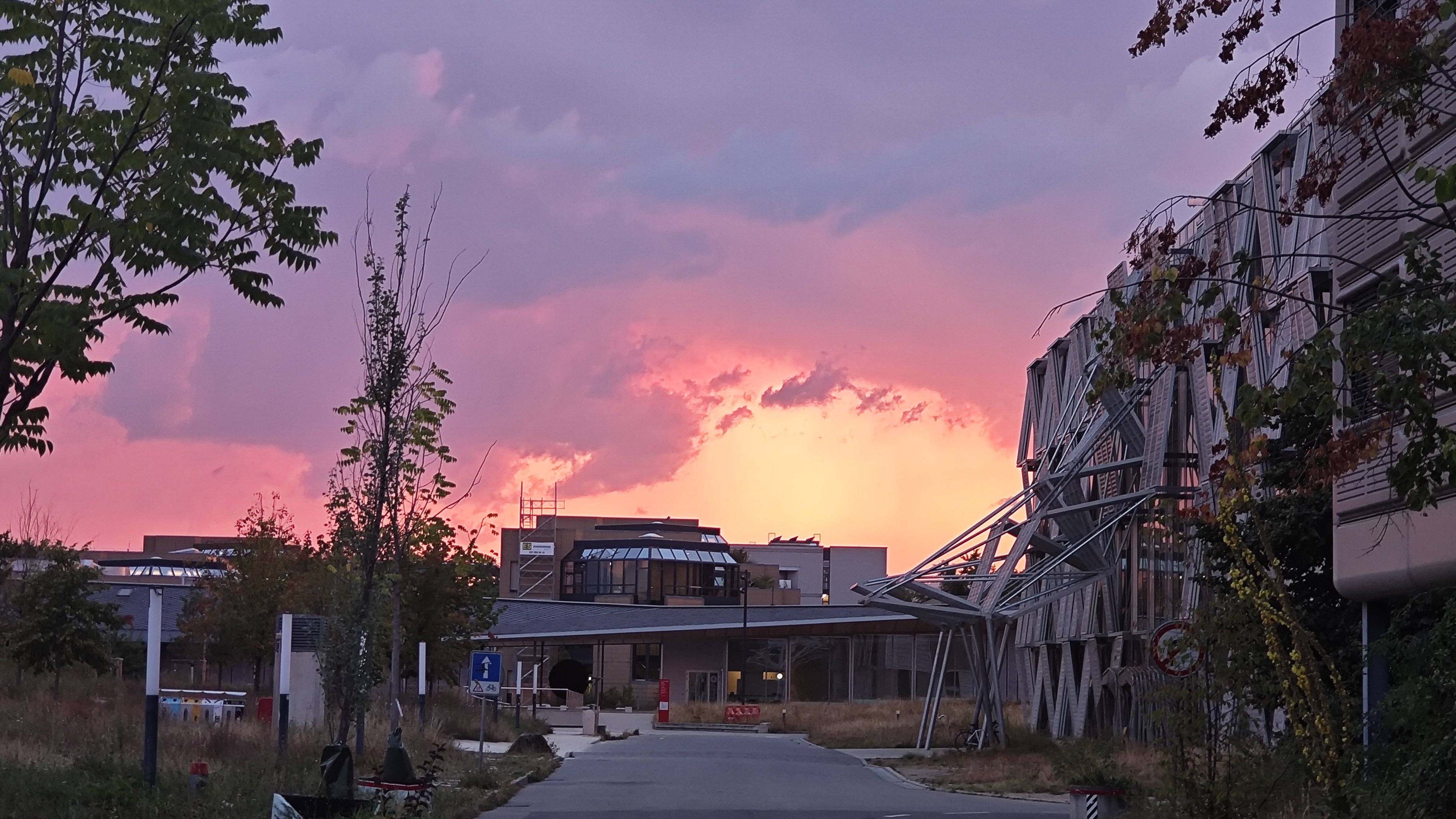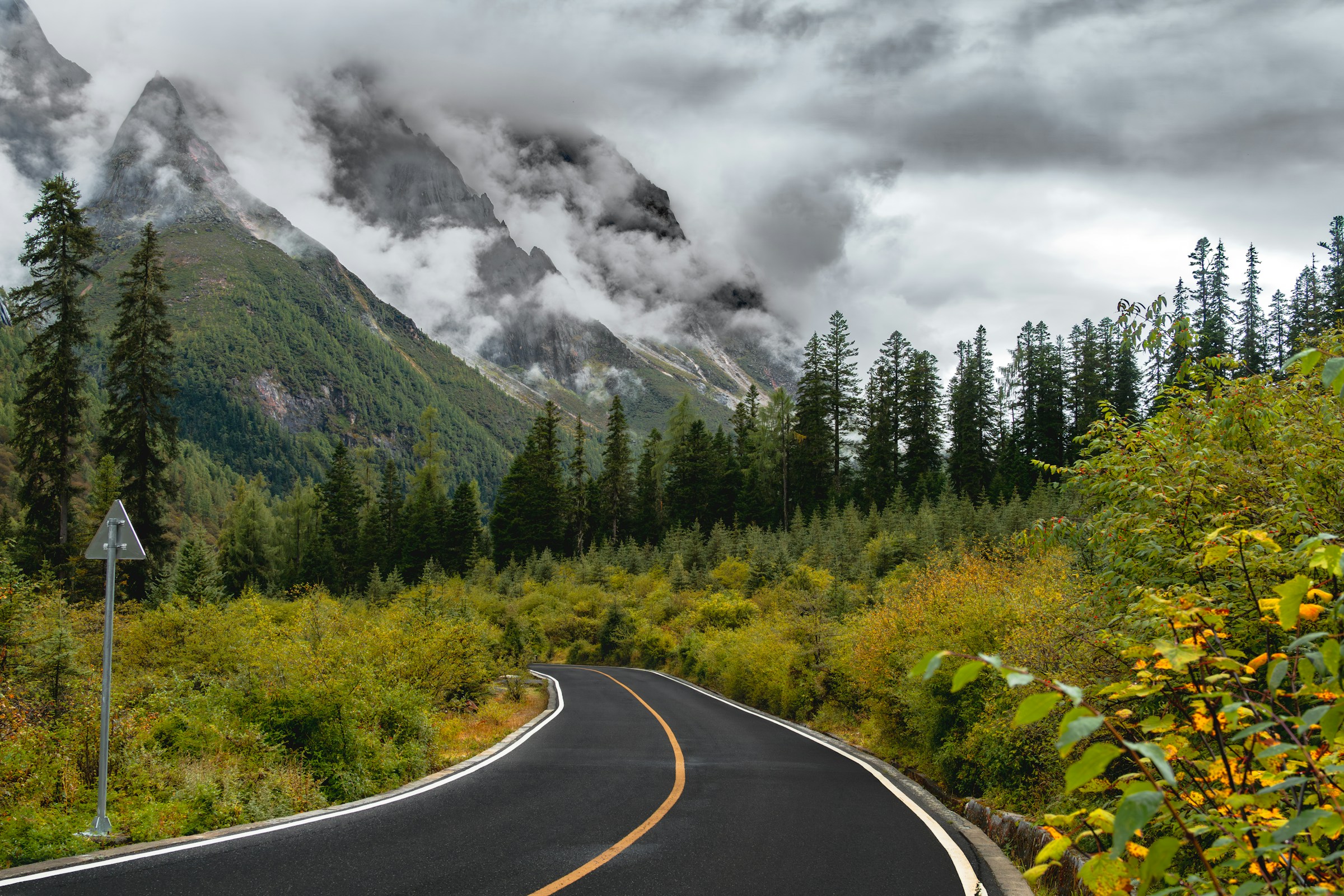Swiss Journey: Observations, Reflections, and Impressions
I went to Switzerland once during the summer vacation—a truly rare and unforgettable experience. While the memory is still fresh, I’d like to jot down a few thoughts to record it.
Regarding the scenery, overall, if you don’t have the chance to go to Switzerland, traveling to Sichuan (especially western Sichuan) can serve as a decent substitute. As someone from Sichuan who’s accustomed to mountains and rivers, Switzerland’s landscapes may not strike me as particularly breathtaking.
Ah, as an old Chinese saying goes, people always first see the mountain as just a mountain, then consider it is no longer a mountain. Whether you ever get to the point where the mountain is once again simply a mountain depends entirely on your own inner work. Even the Swiss who grow up surrounded by these peaks probably grow used to them and think, “Well, maybe it’s nothing special after all.”
In Switzerland, neither the metros nor the trains have security checks or assigned seating. If you’re only staying a few days, you can buy a Swiss Travel Pass straight from SBB (they even have a WeChat mini-program). The pass covers every form of public transport inside the country—metros, buses, boats, trains—and also gets you into the vast majority of tourist sights for free.
Single tickets, on the other hand, are tied to a specific departure: you must ride the exact train you booked, and they’re not cheap. Unlike in China, there are no ticket gates before you board; everything is on the honor system. Once you’re on, inspectors may appear at random. During my fifteen-day stay I was never checked on a city bus or tram, and on the railways only on the longer legs—but if you’re caught without a valid ticket the fine is hefty.
On my very first day, riding the airport train from Geneva to Morges, I watched a fellow passenger get nailed: he’d bought a short-hop ticket and kept riding. The inspector wrote him a fat fine on the spot.
Platforms: almost bare-bones
A little wooden chalet on the hillside, with a wide green lawn right at the doorstep. Good atmosphere.
Walking in the mountains feels cool (I mean, both the atmosphere and the temperature). It is close to what I thought the Nordic countries would be like. The wind from the peaks is cold and makes your mind feel clear and calm.
Wild strawberries
Prices in Switzerland are high. The government limits food imports and has strict animal welfare rules. The good news is that supermarkets offer many kinds of meat. Each pack carries a clear logo that shows which animal the meat comes from. Even so, Switzerland is often called a “food desert.” Even pre-marinated meat for grilling should be chosen with care; in my view the taste is not great.
Fruit and vegetables cost even more. In China I used to buy a big slice of watermelon, or even half a melon, for every lunch and dinner in the summer. In Switzerland one bite feels like a luxury. The local watermelons are small and not as sweet as the ones back home.
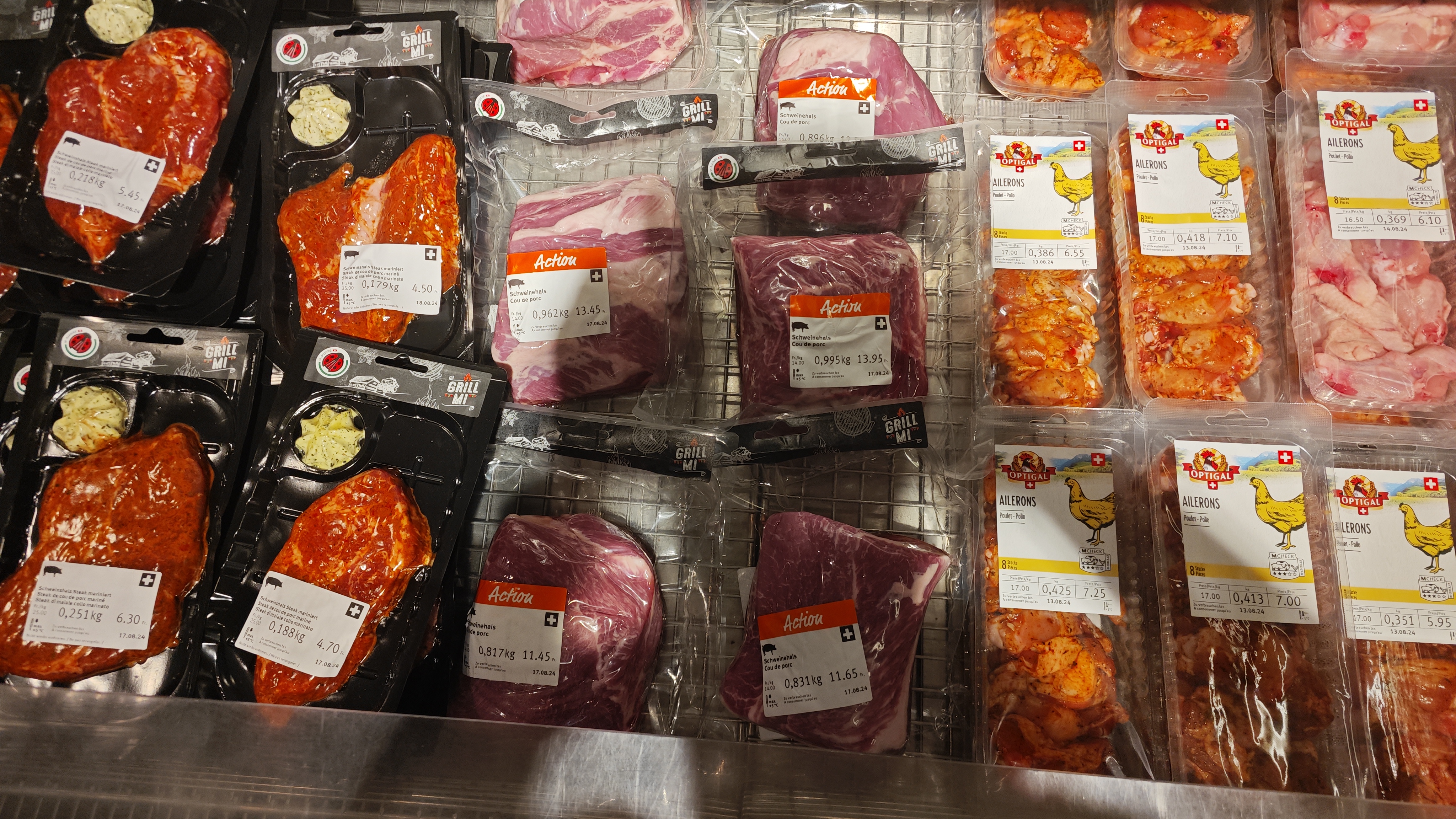
Meat
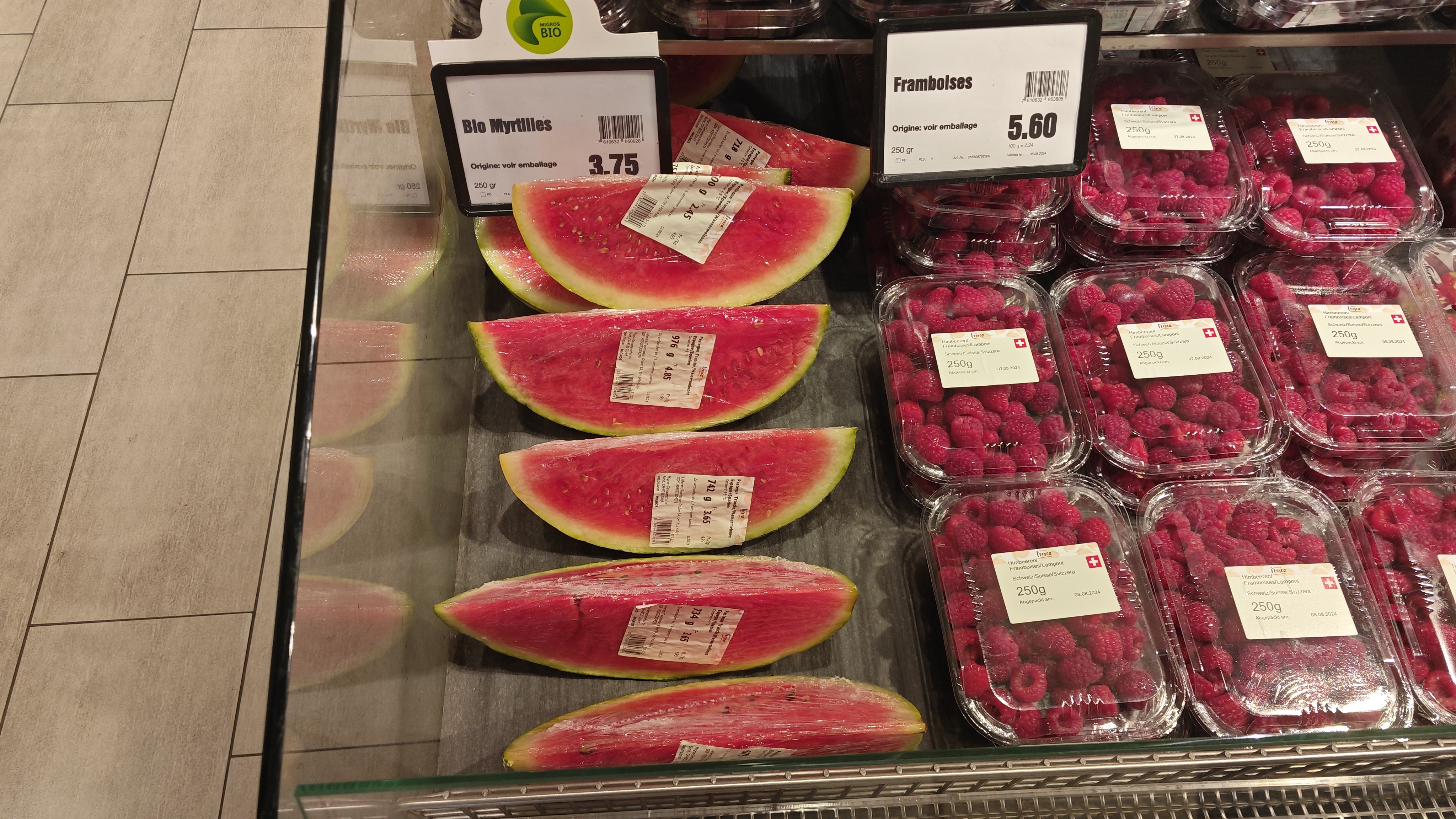
Melon
Raspberries are actually quite dry and have far less juice than they appear. They also seem to ferment very easily. When I set off in the morning, I filled my water bottle halfway with water and the rest with raspberries. By the time I returned in the evening, the mixture already had a faint smell of alcohol.
It is said that these berries are very good for your health. On my third day in Switzerland, I developed a mouth ulcer. I then ate raspberries and blueberries heavily for three days—buying one box of raspberries and two boxes of blueberries—and the ulcer actually healed.
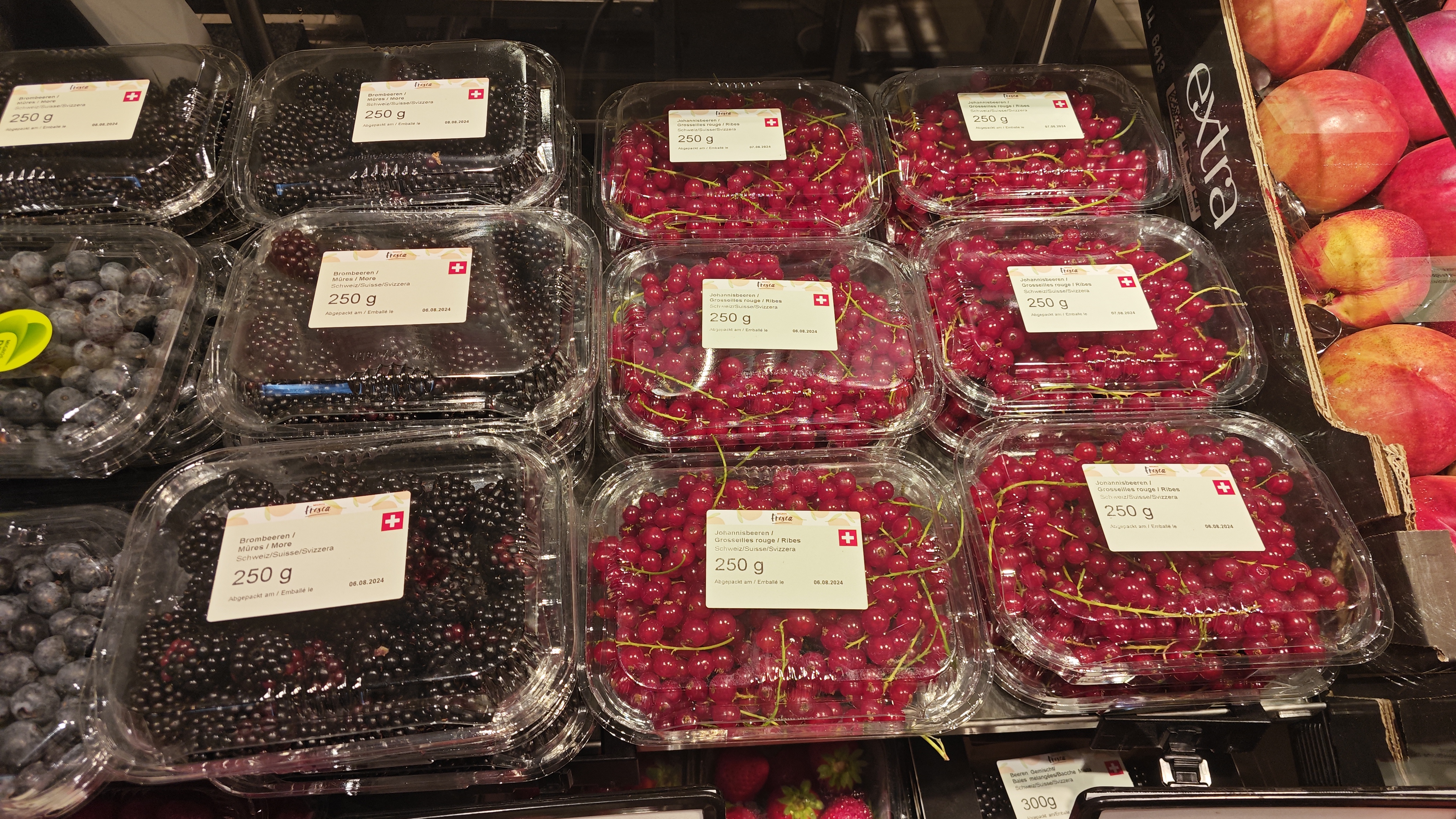
Some other fruits. The red currants on the right seem to grow in northern China as well.
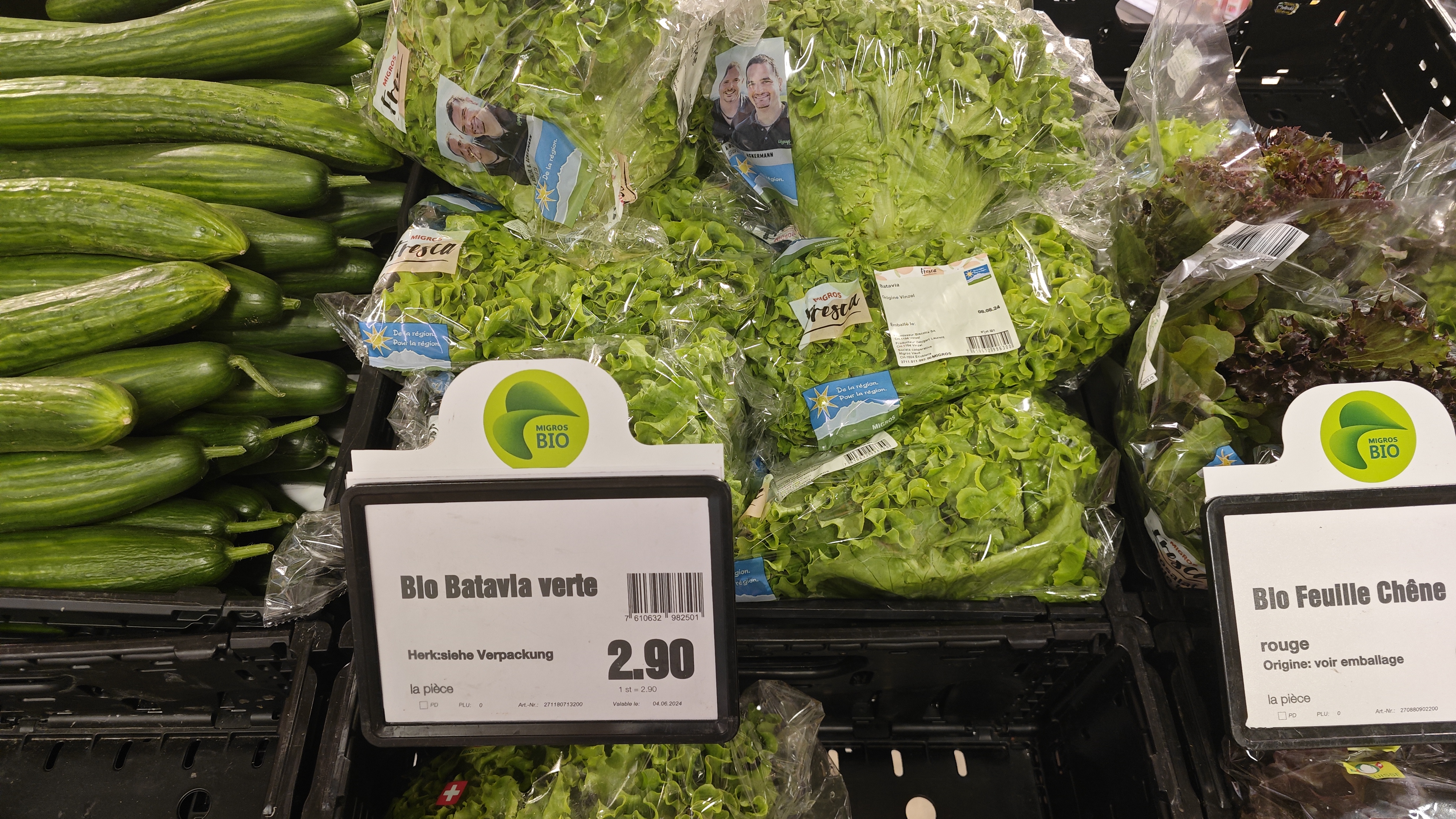
Cucumber and lettuce
Even when a shop window only showed MasterCard and VISA stickers, I still tried my UnionPay card every time. It turned out that about half of the shops, supermarkets and restaurants did accept it. The amount was taken in CNY and changed into Swiss francs automatically.
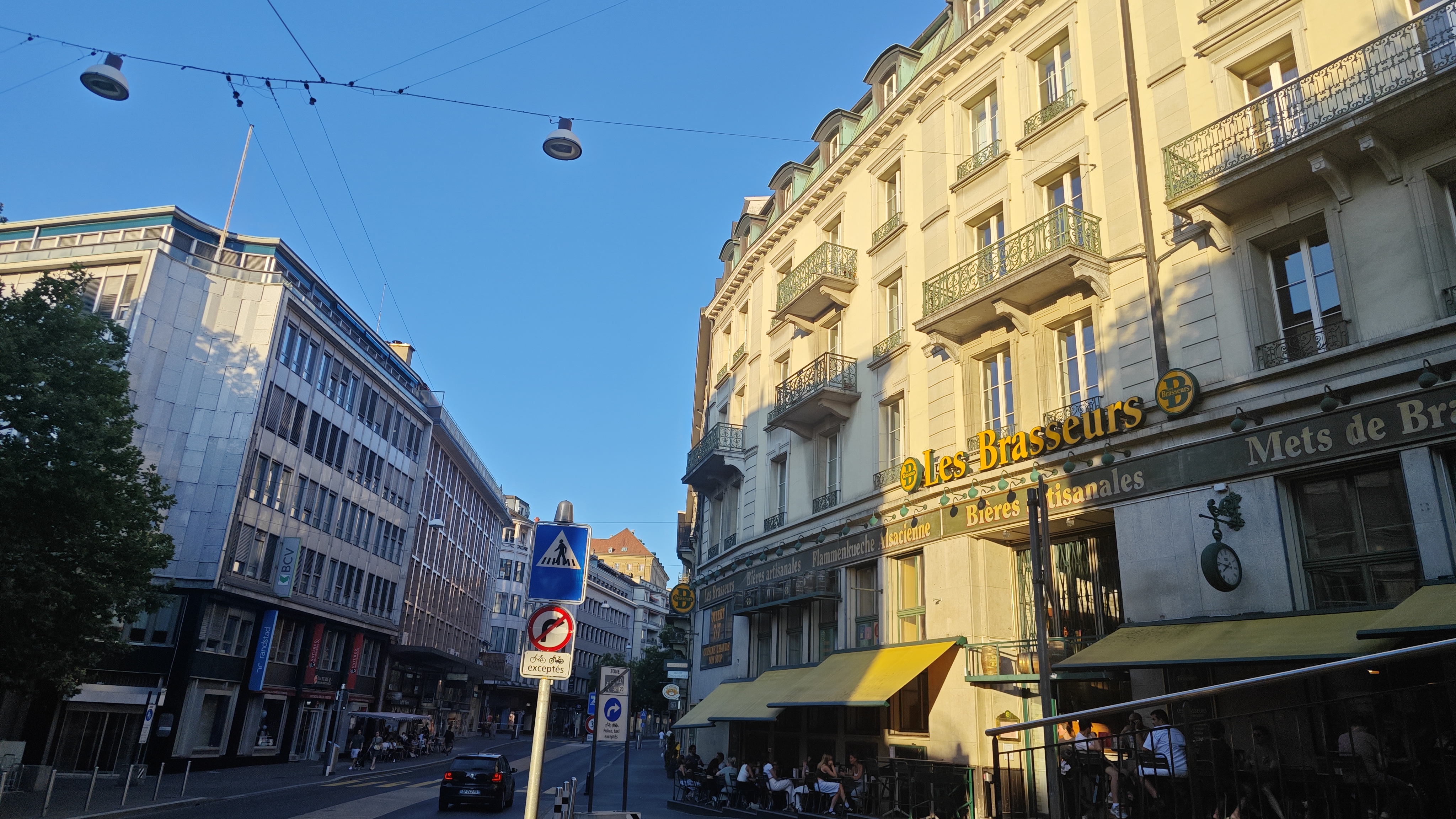
Evening street; walk up from here and you will reach Lausanne Cathedral.
In Switzerland, the main supermarkets are COOP and MIGROS. Compared with the average prices in the country, their products are not too expensive. One day I bought a bottle of beer at the COOP in Lausanne Gare. The cashier asked me seriously, "Can I see your ID?" Only then did I realize he thought I might be under age. Do I really look that young?
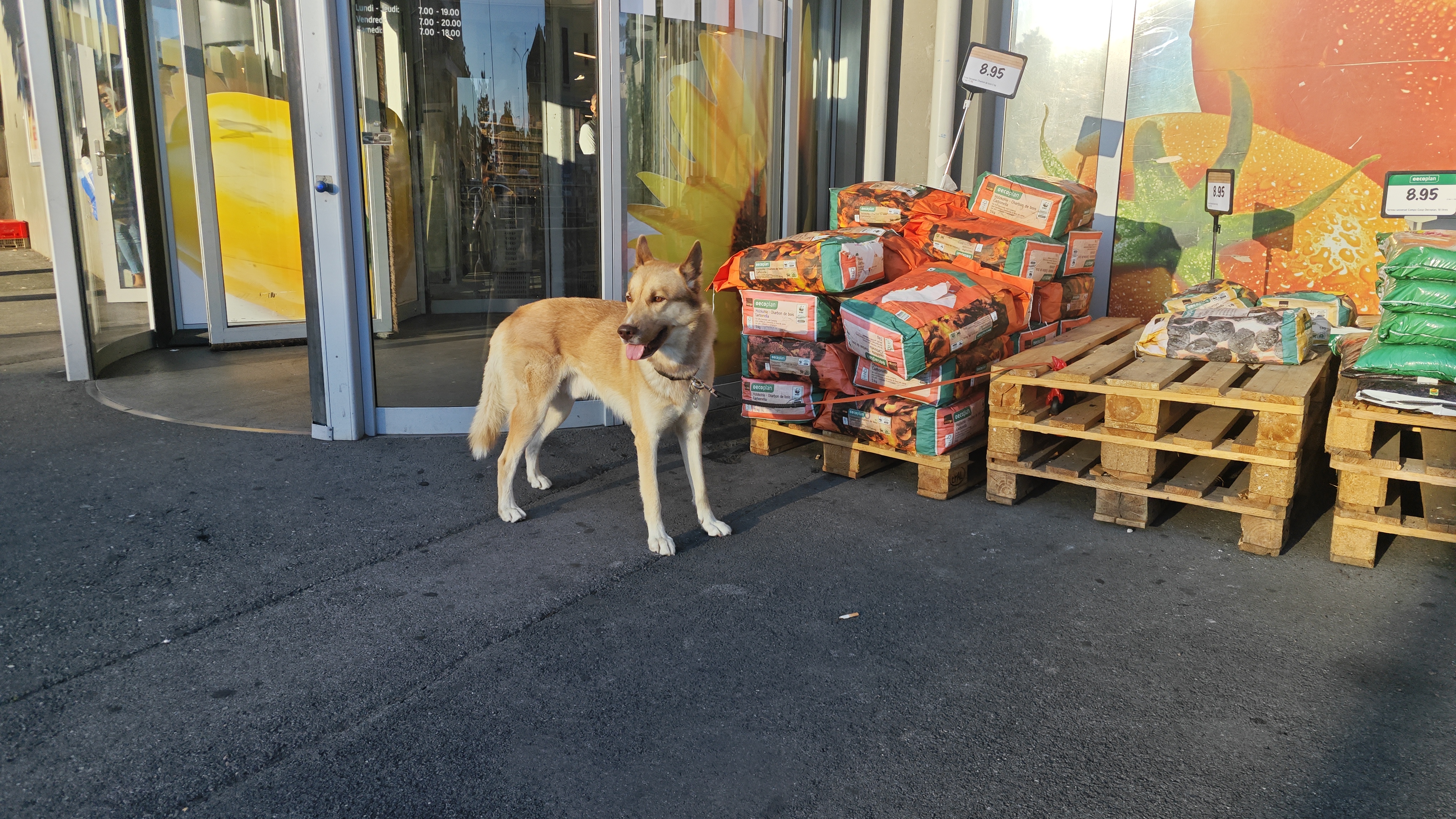
A dog outside a COOP.
Right, even if the price looks low, once you multiply by the exchange rate you still feel the pain. After almost a week in Switzerland I could not stand the tasteless food any longer, so I spent what felt like a fortune: 3 Swiss francs, about 24 yuan, for a 350 mL bottle of Coke. Later I found that COOP sells a bigger bottle, 1.5 L, for only 1.2 francs, but I never bought it again.
The must-see spot in Geneva is the Palais des Nations, the European headquarters of the United Nations. In front of it stands a giant broken chair, a reminder of the harm war does to ordinary people.
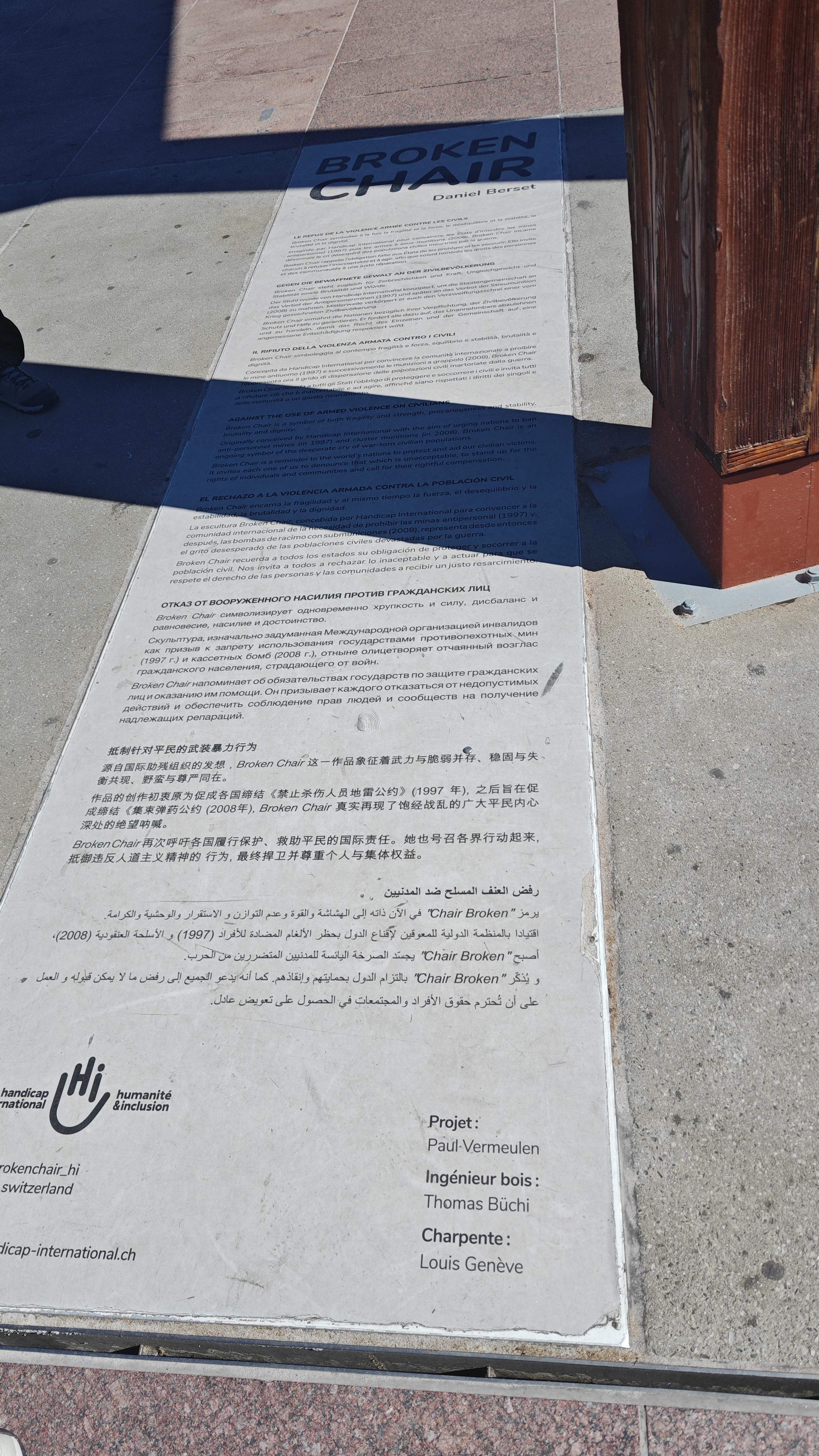
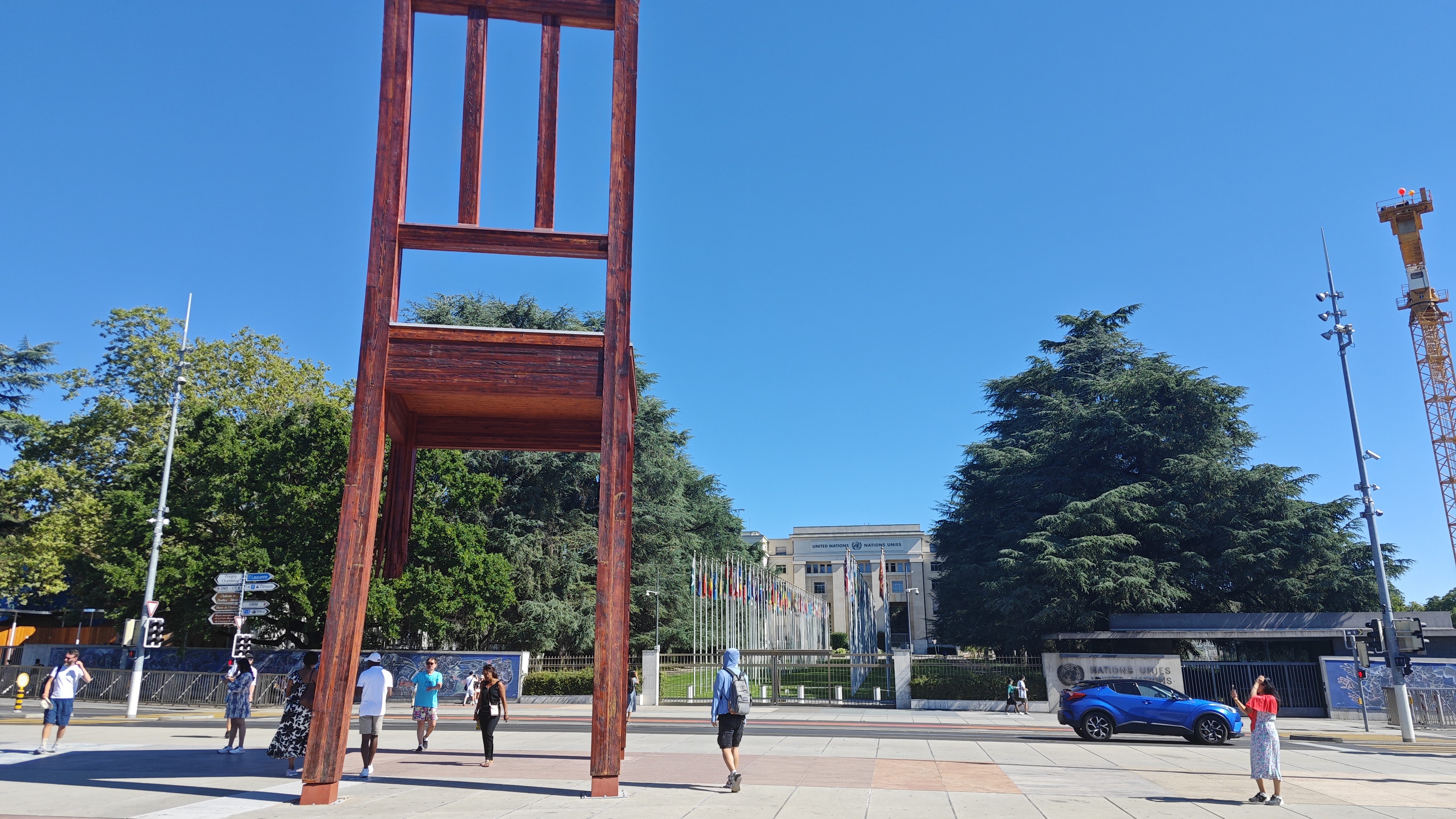
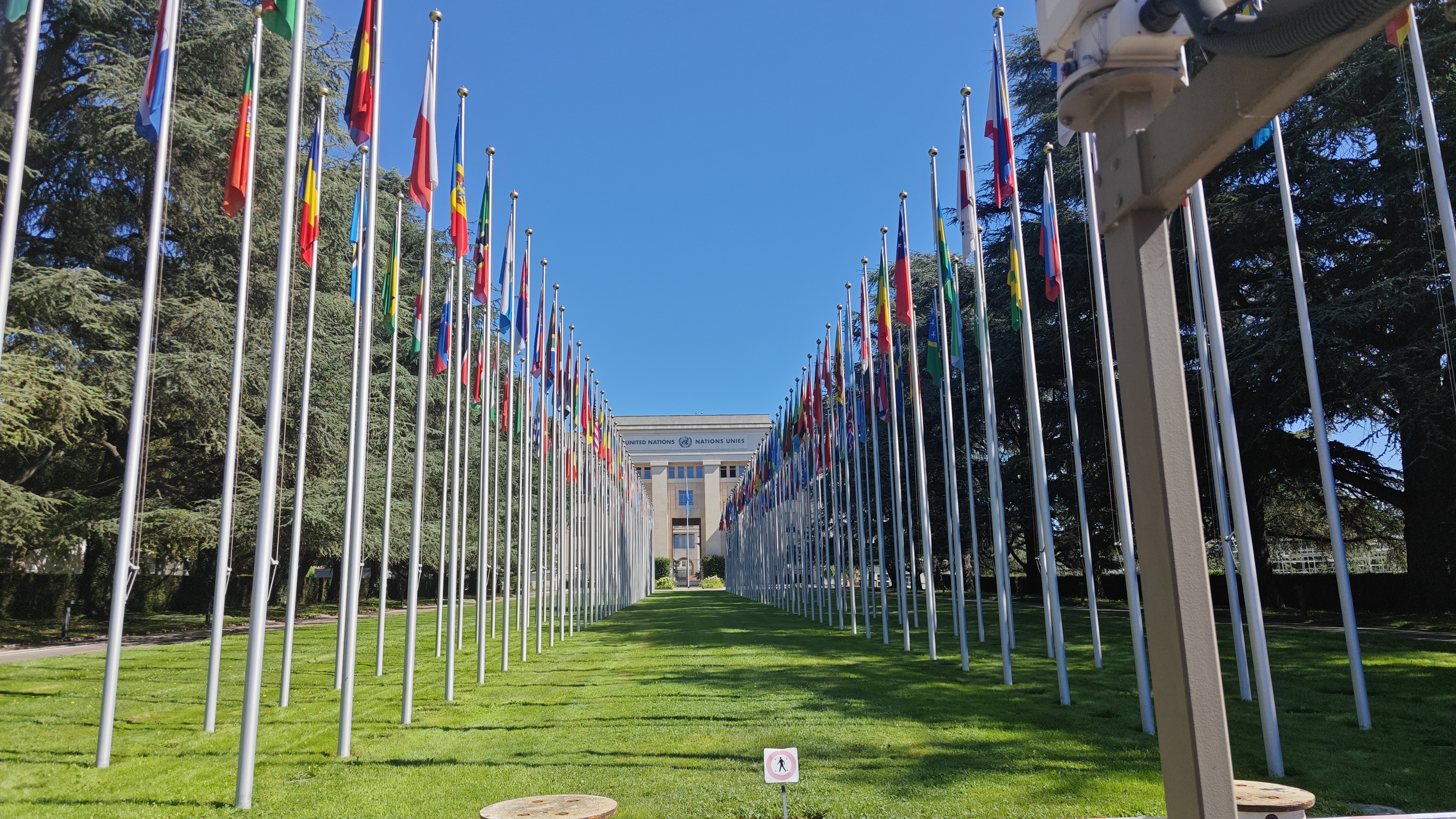
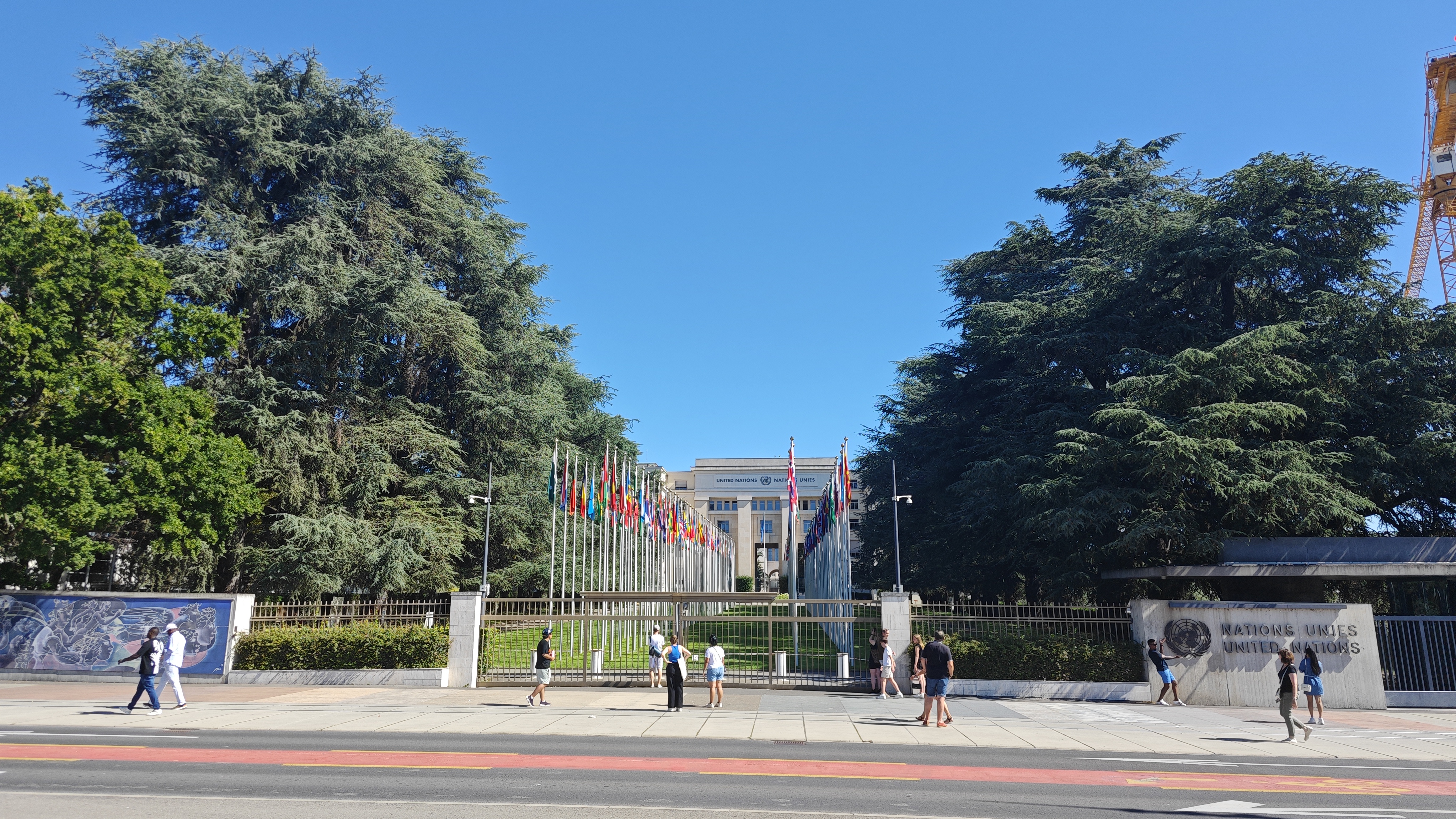
Less than one kilometre from the Palais des Nations is the Botanical Garden. It has many kinds of plants, even tropical ones, and lots of water-lilies. When you leave the garden you can see the snow-capped mountains.
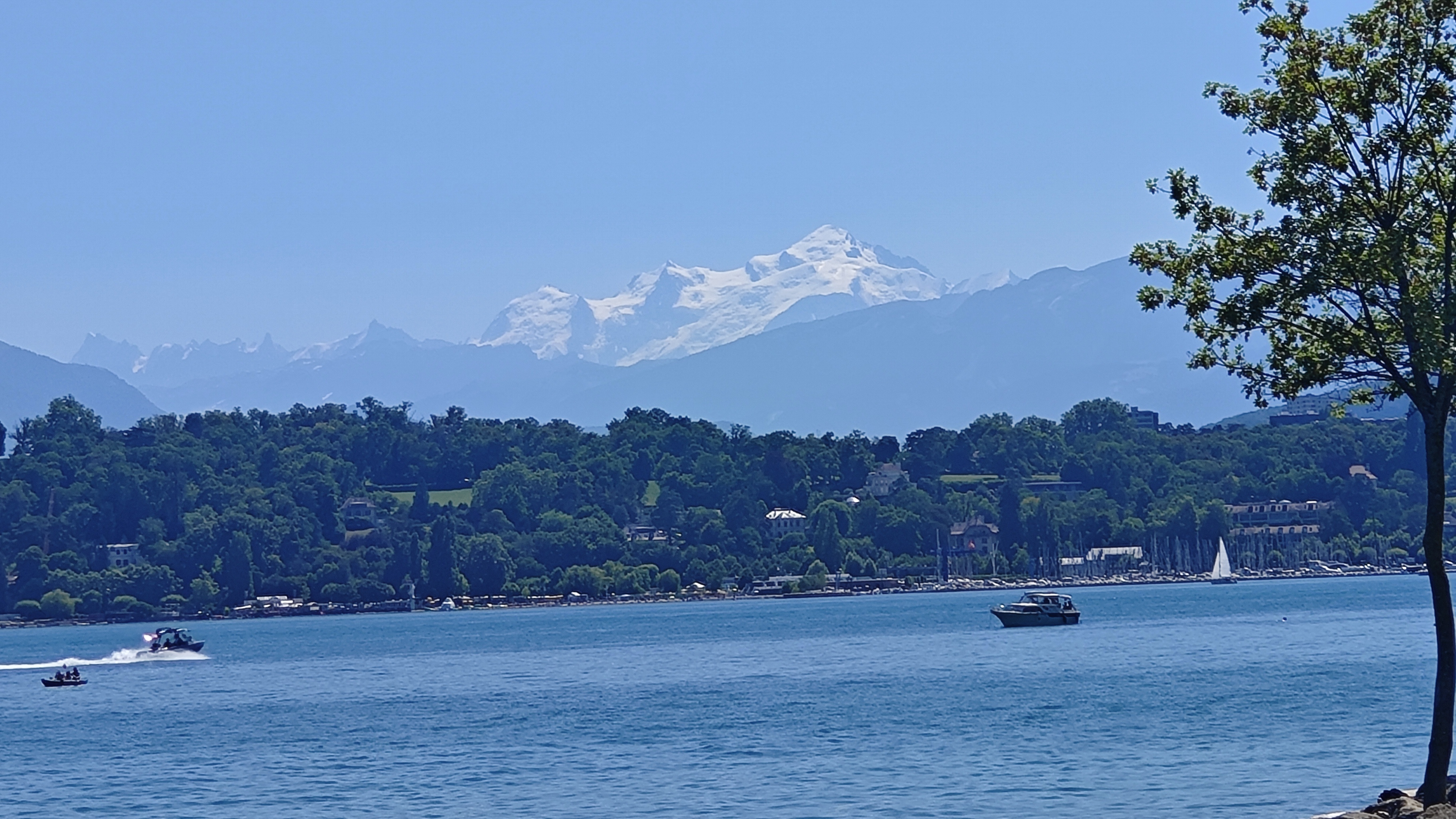
Across the lake are the snow mountains.
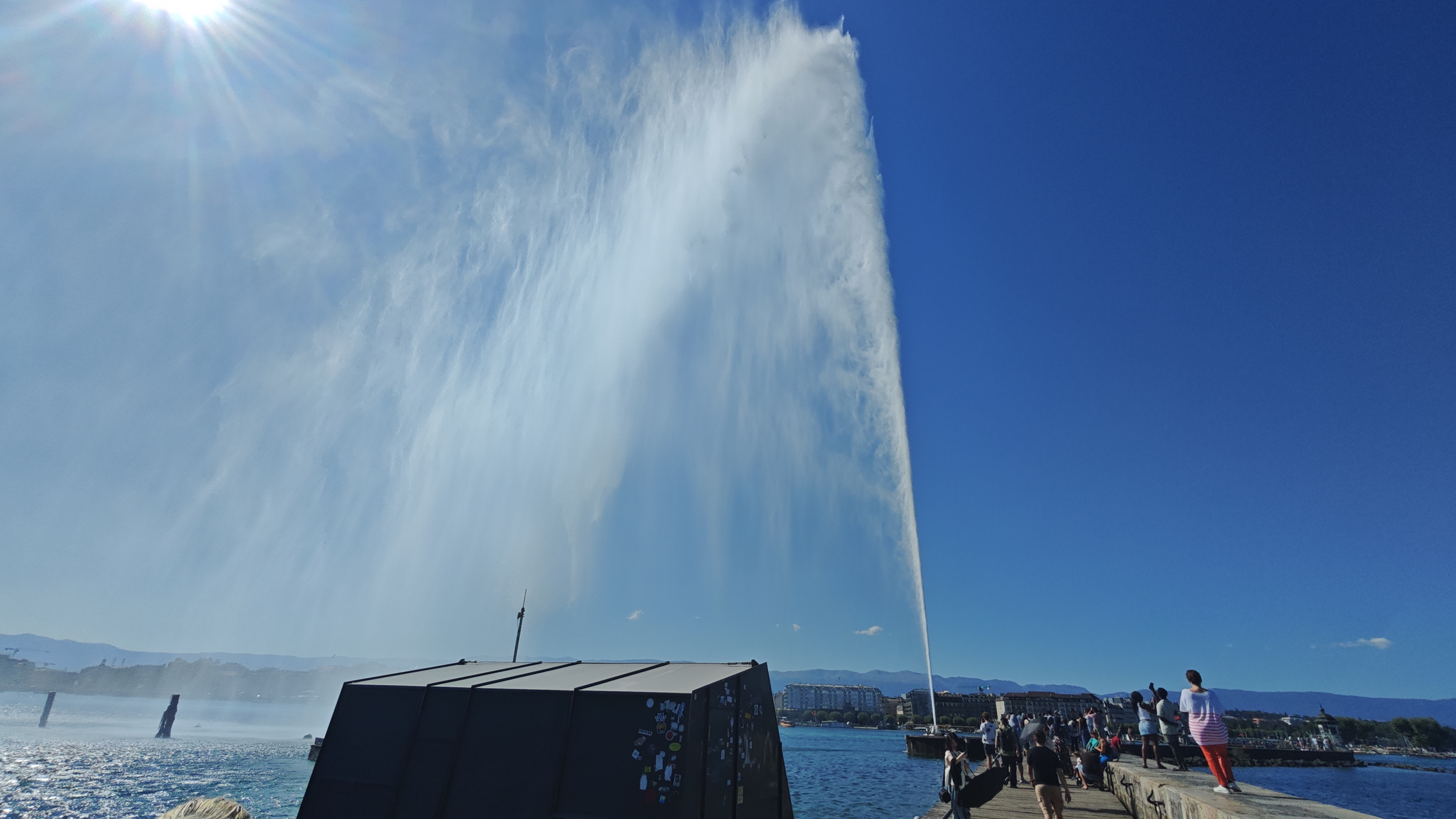
Geneva's huge 140-metre fountain.
Then there is the big fountain in Geneva. From here to France is just one step. Prices in Switzerland are high, but France is cheaper, so many people go shopping in France. There are no border checks between Schengen countries, so after entering one Schengen country, goods and people can move freely through all of them. That is why I still do not understand why Swiss prices are so high.
A funny thing happened by the big fountain. Luxury shops stand right next to it. We showed our attraction ticket to get a free souvenir, and the assistant asked where we were from. We said China. She replied that China is very big and listed “Mainland China, Hong Kong, Macao, Taiwan.” We were impressed by her knowledge, then she added, “…and Singapore.” We quickly thought, better not mix those up.🙂
One day on the railway I met an elderly gentleman. As soon as he boarded the train he began to read a newspaper, glanced at the front page and saw a headline that smeared China. The old man probably noticed that, of the four seats facing each other, three were occupied by Asians and he was the only local, so he asked us, “Where are you from?” We replied, “From China.” He immediately perked up. “Have you been to Beijing?” we said, of course we had, “We flew to Switzerland from Beijing.” His tone turned serious at once. “Do you know Tiananmen Square?” I heard that and thought, “Awful!” Then he launched into a long list of alleged human‑rights violations. We quickly waved our hands and said, “Fake news,” “It’s all fabricated by your own media to deceive you.” 😂 We added that China now offers a 144‑hour visa‑free period, so a visit could let him see the real situation. The old man replied, “I won’t go. If I do, the PLA will arrest me; the PLA are great villains.” That remark left us speechless. After a while the old man fell silent as well, perhaps realizing that the China we described was completely different from the picture painted by the newspaper and the news he had heard.
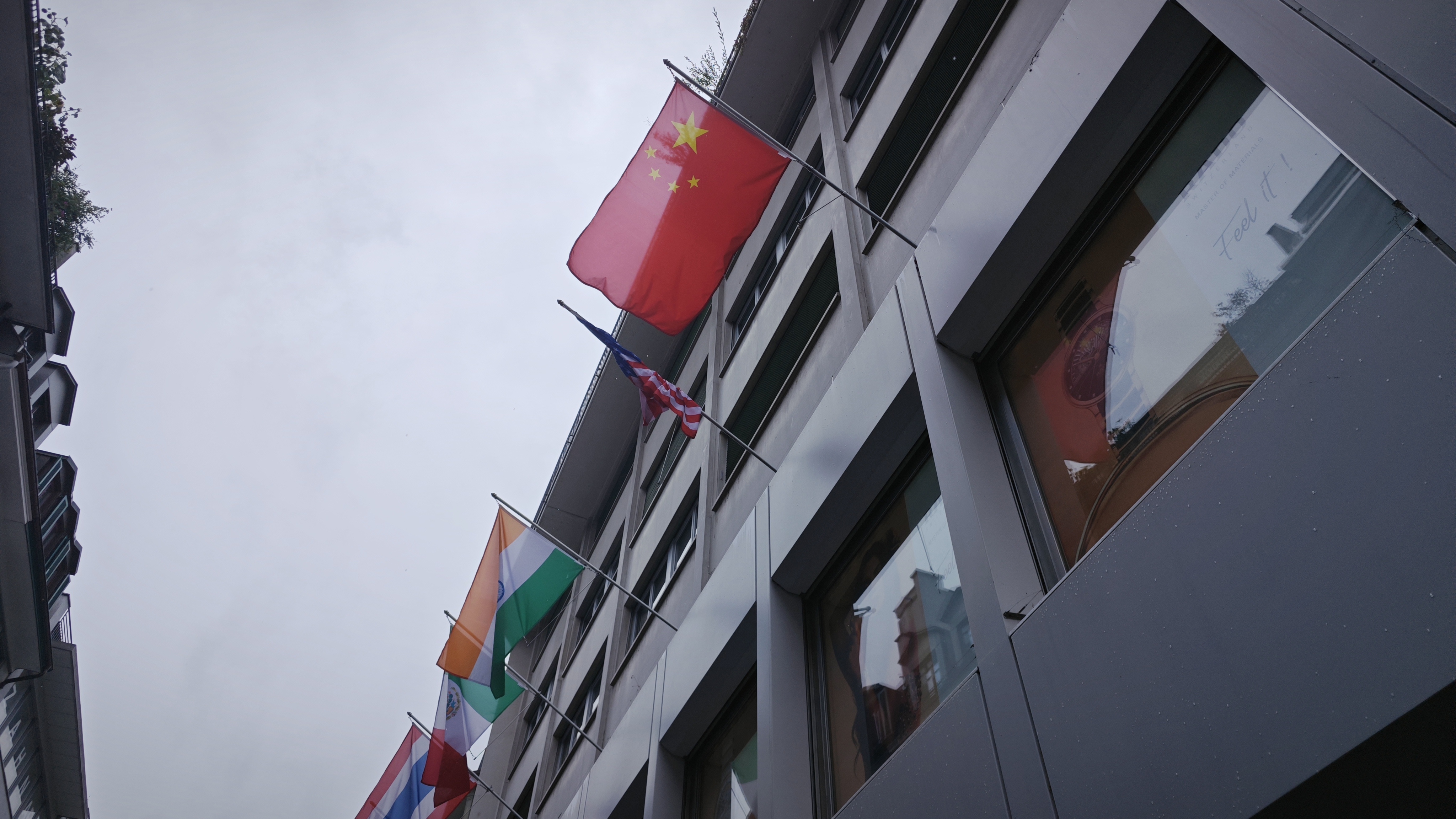
There were many national flags displayed outside the luxury boutique. That day the wind was strong, and the flags of every country were fluttering in the breeze, except…
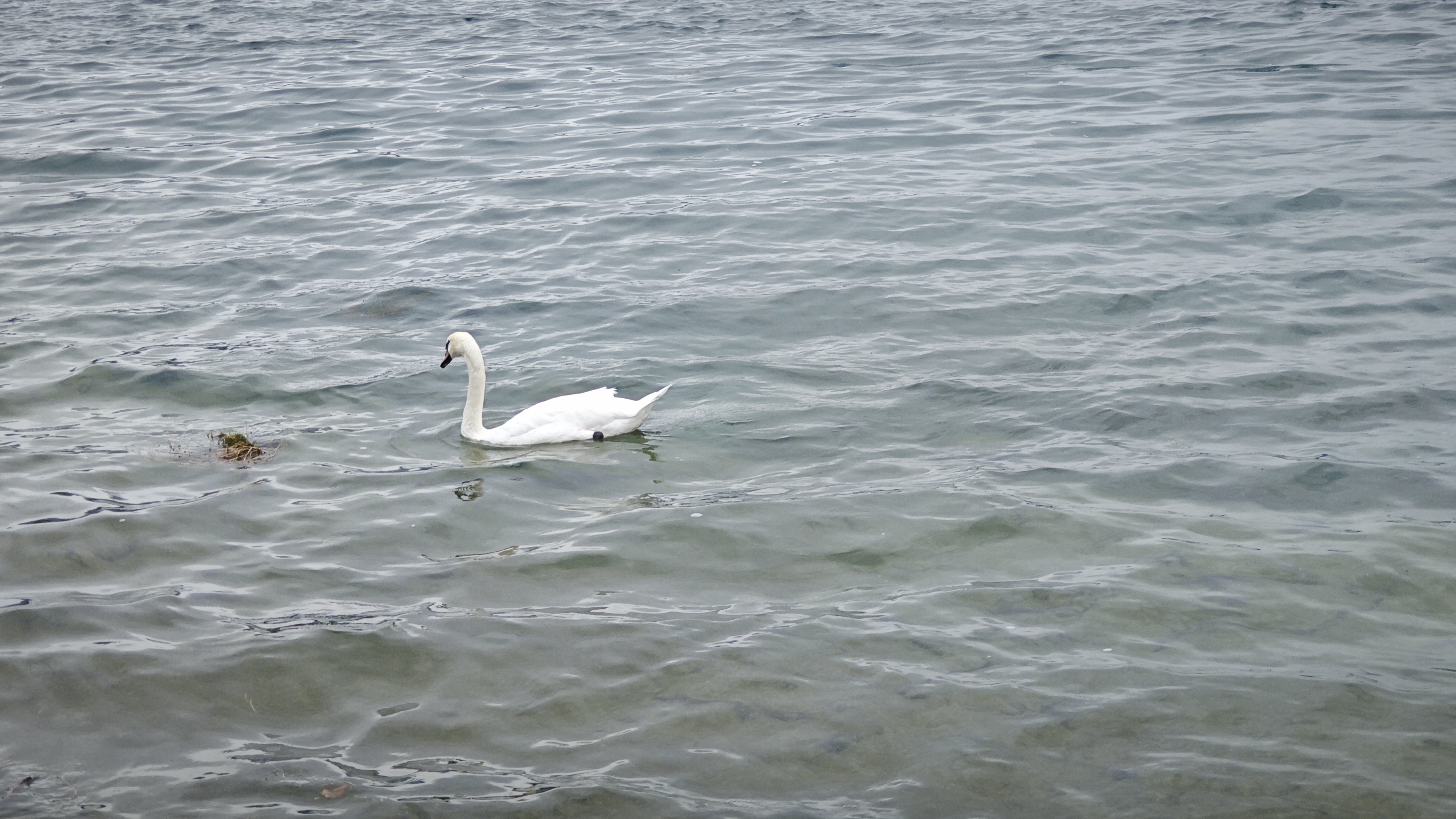
Swan
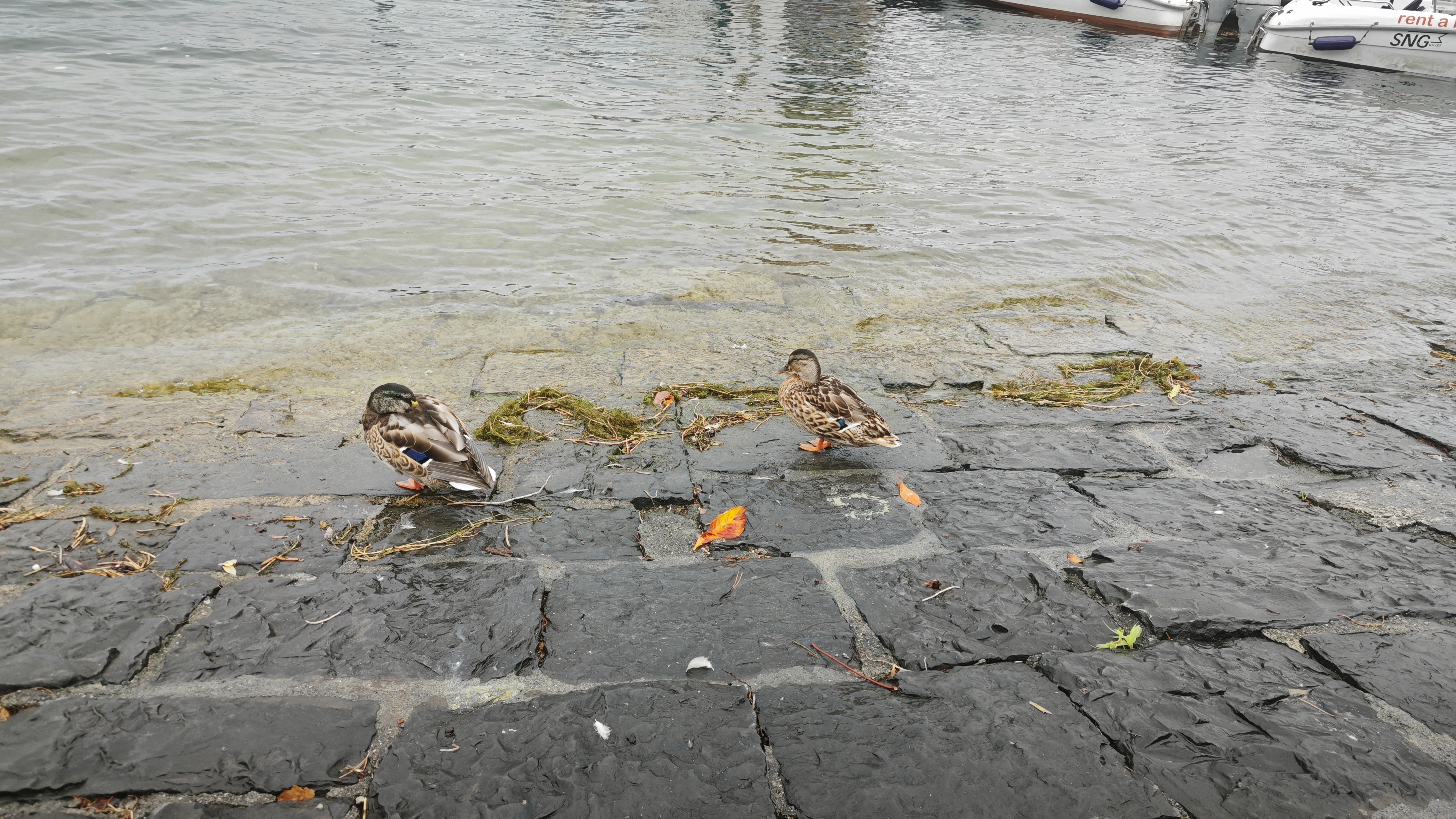
Ducks
The blue night scenery of Lake Geneva is also very beautiful.
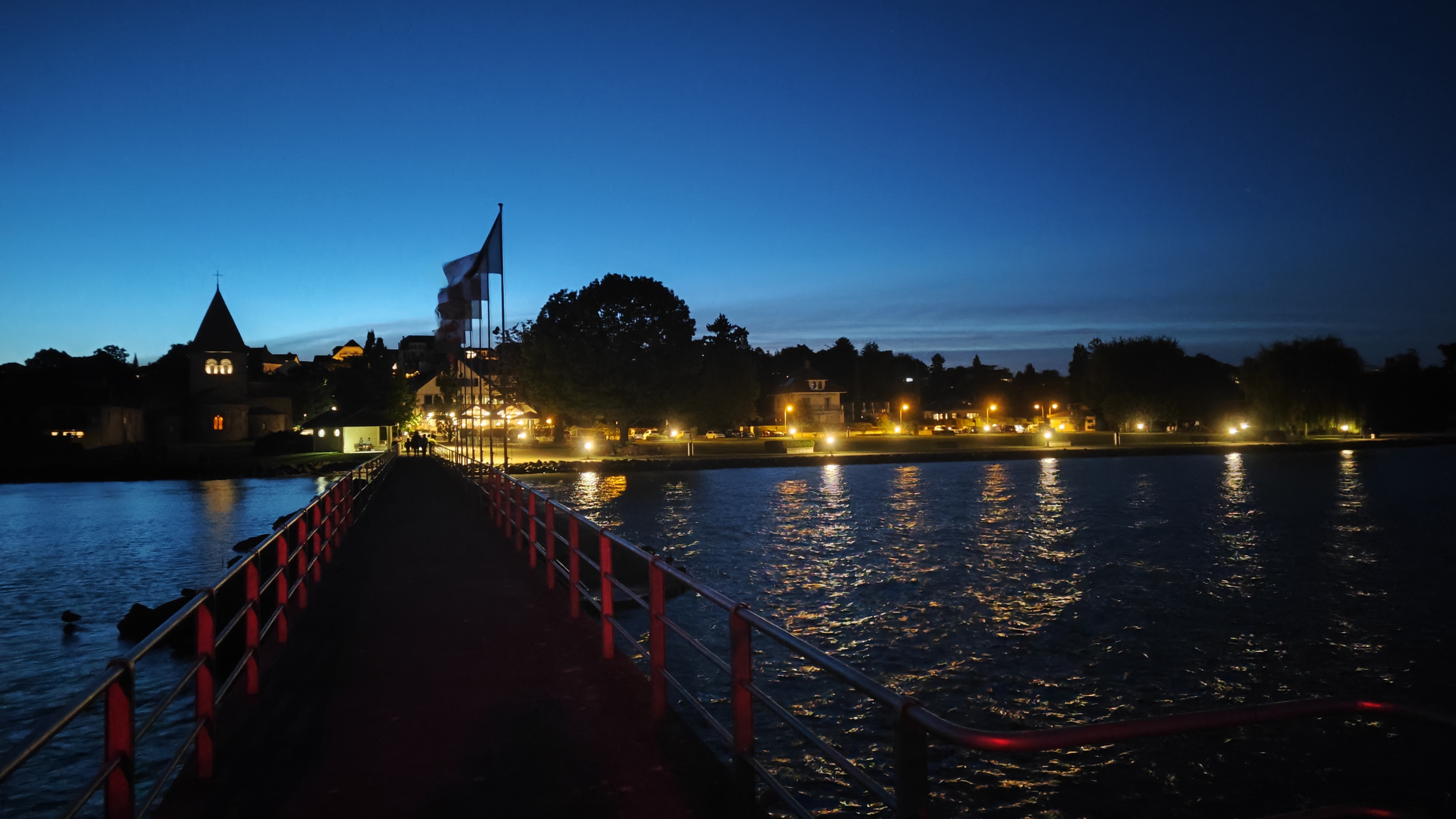
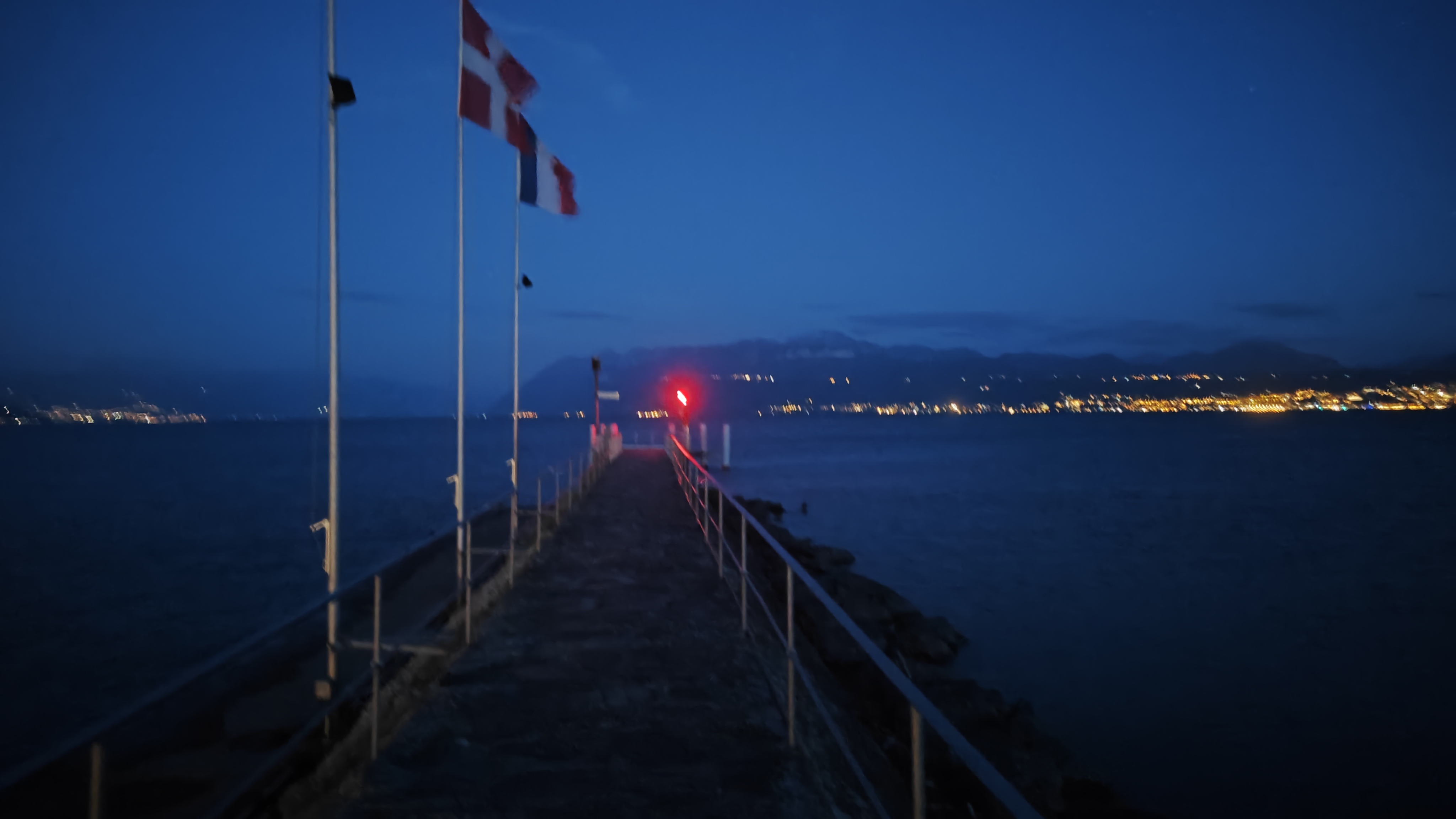
Another attraction worth visiting in Lausanne is the Olympic Museum, the hometown of Pierre de Coubertin, the founder of the modern Olympic Games. From the centre of Lausanne, let’s say the Lausanne Gare railway station, to the museum is only a short journey, a few stops on the metro. The metro line is unusually steep, so even the stations are built on a slope, which makes the ride quite interesting.
Inside the museum you will first encounter the souvenir shop, where you can buy memorabilia from past Olympic Games. When I went, the Paris 2024 Games were just being promoted, so I purchased a T‑shirt for 60 Swiss francs.
Because I held a Swiss Federal Railways Travel Pass, entry was free. Once inside, the exhibition traces the origins of the Olympic movement, its development, and the Games that have had a major impact on history.
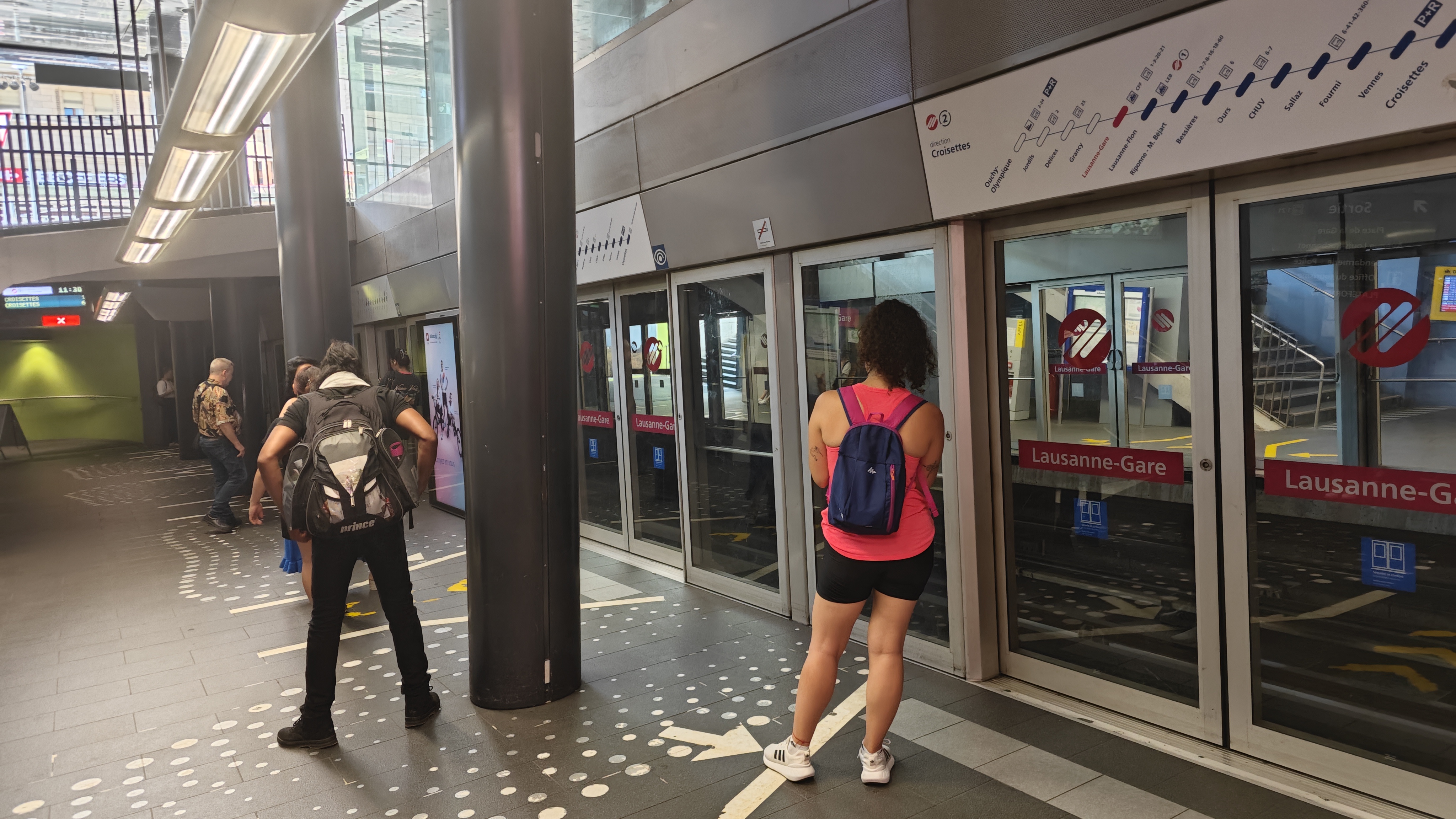
The floor of this subway station is sloped.
Next I went to Zürich, another of Switzerland’s larger cities. While I was there I visited the Kunsthaus Zürich; although I could not grasp all the artistic nuances, the museum was still an enjoyable experience.
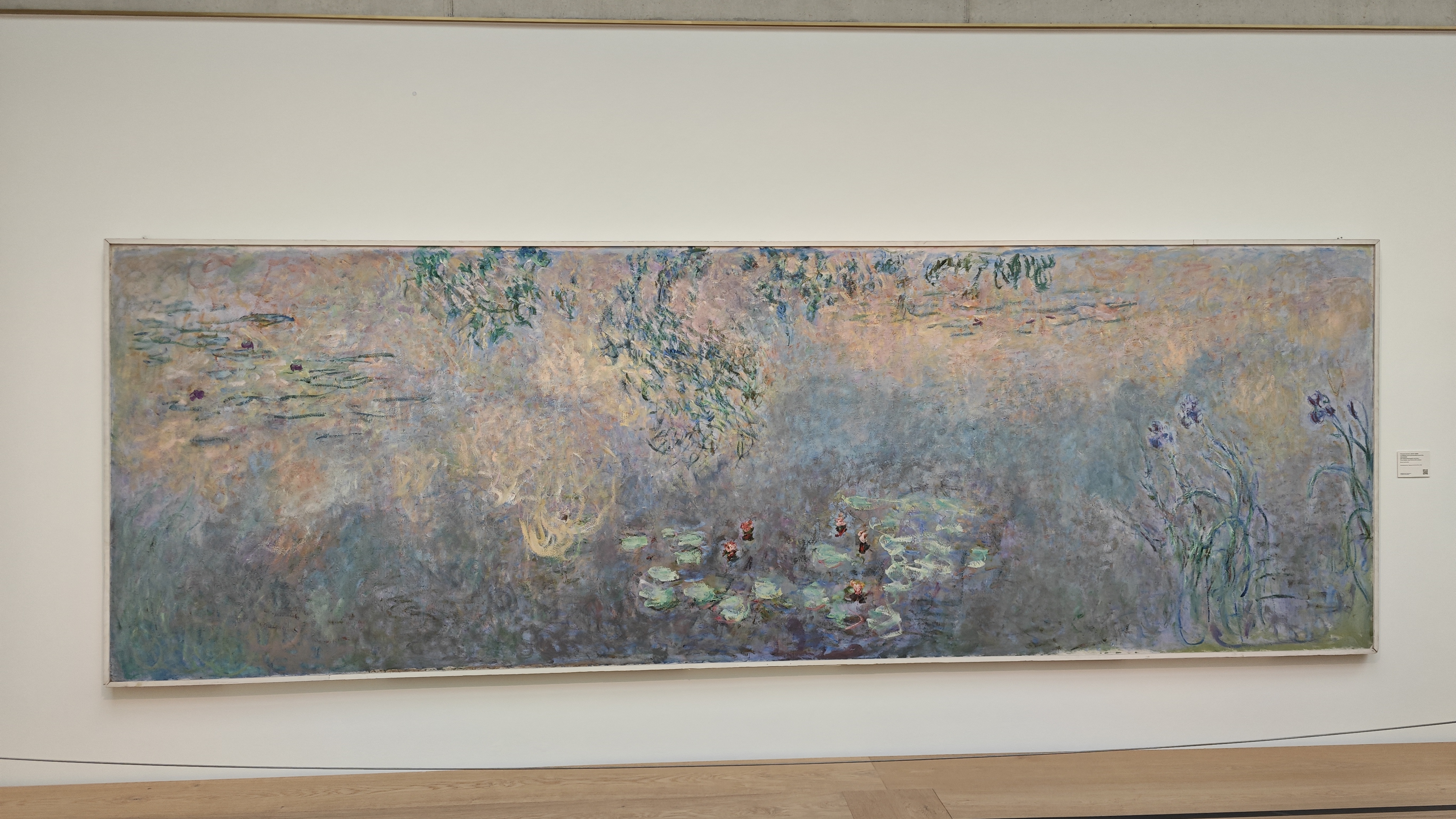
Ending image
